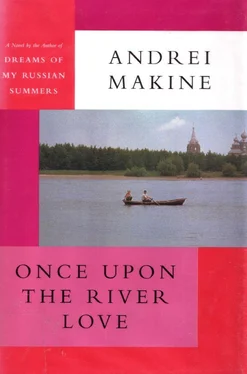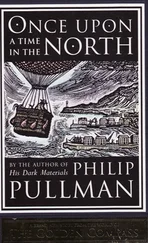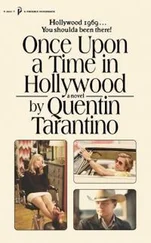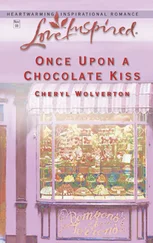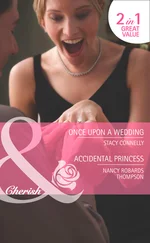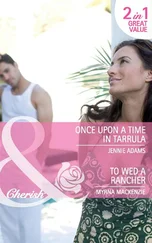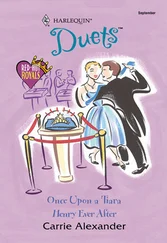He shows me a photo, brightly colored like a holiday snapshot. In front of the long mound of the grave, Utkin has been captured, involuntarily standing at attention. This is the Utkin of "twenty years later" with a little Trotsky-style goatee and eyes invisible behind his glasses. Beside him a woman crouches, seen from behind, piling up the earth around a plant with big purple flowers. Her very practical gestures make her astonishingly distant from, foreign to, the tortured gravity of Utkin's expression…
So does everything come down to this little mound of fresh earth lost somewhere beneath the skies of Central America…?
The dining room of the Russian restaurant, generally half empty, is well filled this evening. The Orthodox Easter. One can see the grizzled manes and noble brows of the first emigration, and some thin faces and embittered expressions from the latest wave; and plenty of Westerners, who have come to sample Slavic charm by candlelight. The musicians and the singer are not there at the moment – the obligatory intermission between two courses. Their repertoire matches the degree of intoxication. After the break come songs more in accord with the quantities of vodka consumed. Conversations become heated, remarks overlap, slowly spreading a confused hubbub across all the tables. And our host, the famous Sasha, like the conductor of an experimental orchestra, directs this cacophony, now coming over to this group, now to that one.
"Oh yes, Your Royal Highness. The only shashlik of this kind to be made in New York now is ours. After the death of Count Sheremetyev's chef… Yes, my good friend, this wine will help you forget your Moscow fallen into the hands of neo-Bolsheviks… Yes, of course, madam, this follows a purely Russian tradition. And furthermore, you'll see that it will go perfectly with this slightly acid punch…"
He seats us at one of the last free tables. I sit with my back to the room. Utkin stretches out his leg in the narrow space between the tables and lets himself down, facing me. The big mirror behind his chair transmits back to me the multicolored depths of the room filled with the vivid lights of the candles. On the walls hung with red velvet are the "icons" – pages from illustrated magazines cut out and stuck onto rectangles of plywood and covered in varnish. In one corner, on a cabinet, is a full-bellied samovar.
After the first vodka Utkin rummages in his great leather bag and brings out a colored volume reminiscent of a children's book.
"Since it's a time for confessions and faded dreams tonight…"
I open the volume, putting my glass aside. It is a comic book for adults. Quite "hard," from the look of it.
"These are my novels, Juan! Yes, all the plots are mine. The situations, the dialogue, the captions, everything… Impressive, huh?"
I leaf through the colored pages. With some variations, the stories are all similar: the characters are clothed at the beginning, undressed at the end. The backdrop for their nakedness is sometimes a lush tropical wilderness, sometimes the luxurious interior of a villa, on occasion even the weightlessness of a spacecraft… As the pages flick past, a whole firework display surges out of them: curvaceous backsides being grasped by the hands of hairy men; pink or tanned buttocks; genitals being flourished; hungry lips; luminous thighs. Suddenly I understand everything.
"So it was to write these that you made use of my love stories?"
Utkin looks sheepish. He pours us some vodka.
"Yes. But what could I do? You had so much experience. And I had to invent a new one every day!"
I turn over the very last pages of his book. I come upon a series of images that strike me as strangely familiar.
Utkin guesses what scene I have just discovered. He blushes, holds out his hand, and snatches the book from me, knocking over my glass. But I have time to take in the final sequence: the woman spread-eagled over the top of the grand piano, the man splitting her body in two and emitting roars in bubbles, like puffs of steam from a locomotive in a film cartoon…
We mop up the vodka. Utkin stammers excuses. The waiter brings us borscht and sets a vessel of piping-hot buckwheat kasha beside our plates.
"So you see, I've sunk pretty low," says my childhood friend, with an embarrassed smile.
"Not at all. In any case, as you probably guessed, my princess was pure invention. I lied to you, Utkin. That whole story. It wasn't the Côte d'Azur: it was the Crimea, a hundred years ago, or a thousand years ago. I no longer remember. And she wasn't wearing an evening gown the way she is in your pictures, just a faded satin sundress… Her body smelled of rocks baked in the hot sun. And as for the candelabra on the piano, I guess no one had lit the candles in them since the Revolution…"
We fall silent and stir fresh cream into our borscht.
"It's stupid. I should never have shown you my masterpiece," he says finally.
"Of course you should… Besides, the pictures are really good."
Utkin lowers his eyes. I see that my compliment has touched him.
"Thanks… It's my wife who did those pictures."
"You're married? Why didn't you tell me?"
"Well, I did tell you about her once… But we got married a month and a half ago. She's an American Indian… And she's a bit like me… That is to say – er – she's… she's a bit hunchbacked. She fell off a horse when she was little… But she's very beautiful."
I nod my head with conviction, in a hurry to say something: "So you've found your Eurasian roots?"
"Yes… Look, I think we're doing less harm with these comic strips than the people who sell all that kitsch that passes for literature in the States… And what's more, if you noticed, in my strips the bodies are always beautiful. My wife wants them to be like that…"
Utkin opens the book again above his plate and starts showing me the pictures.
"But the most important thing, you see, is that in each sequence there's a bit of horizon, a space, a panel of sky…"
I can't help laughing. "Do you really think your readers have time to notice that bit of sky?"
Utkin is silent. The waiter removes our plates and sets the shashlik before us. We drink our vodka. Sunk in thought, my friend raises his eyebrows, his gaze lost in the bottom of his glass. Suddenly he proclaims: "You know, Juan, the Americans often remind me of monkeys playing with a clockwork toy. They press a button, the spring functions, the little plastic man starts turning somersaults. The object is achieved… And it's the same in their culture. They construct a new genius and inflate him through TV, and nobody gives a shit about his books so long as the machine keeps working. Button – spring – and the little plastic man jumps around. Everyone's happy. It's very reassuring to be able to construct geniuses. With the help of the word… They juggle with ideas as old as the world, put them together in endless combinations, and sacrifice their own lives. Words, words, words…"
Utkin waves the empty bottle, signaling to the waiter.
"That's right. The life has gone, but the machine keeps working!" he adds, fixing me with his tipsy prophet's eyes. "And it's a great division of labor, you see! The masses get sustenance from products like my comics and the elite from unreadable word puzzles. And you've seen how solemnly they hand out their literary prizes! It's like Brezhnev pinning a new gold star on some decrepit member of the Politburo. Everybody knows who's going to get the prize and why, but they go on playing at Politburos. It's the deathly ivy closing in on the West. The ivy of words that has killed life."
At this moment I see the musicians appearing in the mirror behind Utkin's head. The violin utters a light experimental groan; the guitar emits a long guttural sigh; the accordion fills its lungs, whispering melodiously. Finally, still in the smoky reflection of the mirror, I see her… her.
Читать дальше
